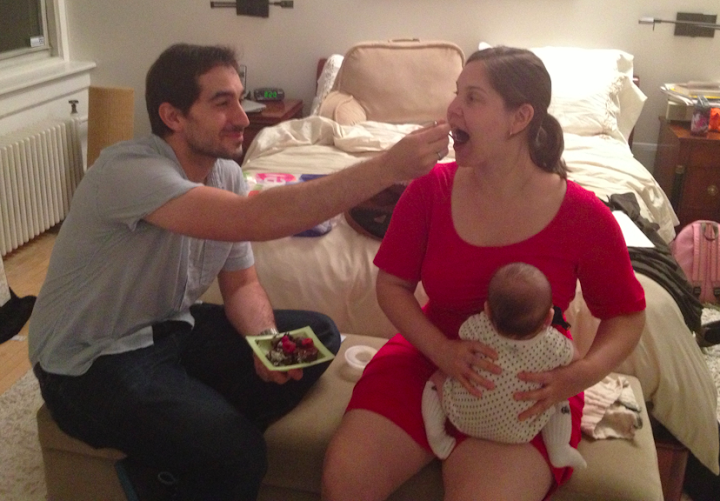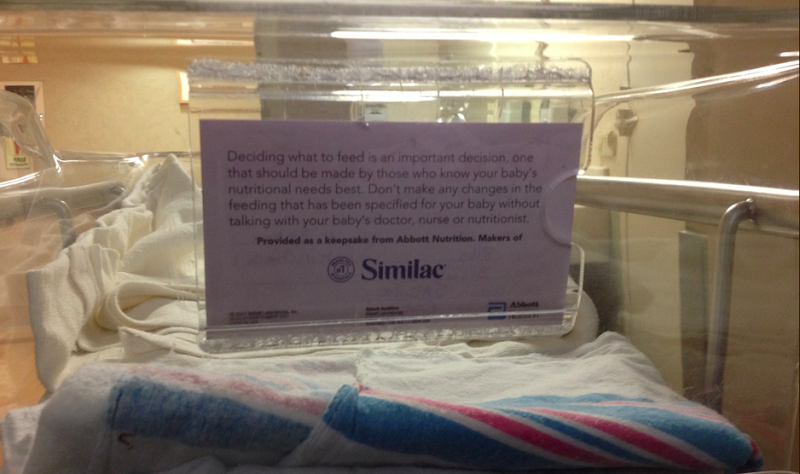A lot of what you read online about breastfeeding is divisive or superficial, unscientific at best, dangerously misguided other times. One writer whose work I always admire, though, is Alison Stuebe, MD, MSc, who writes for the Academy of Breastfeeding Medicine. Her latest post, about "lactastrophes" -- when breastfeeding doesn't work -- is terrific.
All too often my students and clients say that they feel that, while "everyone" is pressuring them to breastfeed, "no one" (they mean, none of their doctors) are actually there at the right time and place to help them make it happen, or seem to care. This is, in part, because physicians do not learn about lactation management in med school.
Dr. Stuebe notes that although obstetricians routinely screen for breast cancer, which is not strictly within their realm, they can be "reluctant to take responsibility for the functioning breast," and, consequently, kind of ignore breastfeeding. (In fact, when she tried to submit the essay to an obstetrics journal, it was rejected, with the reviewer saying it belonged in a pediatric journal, even though it is about lactation, which is, obviously, an adult's issue.)
Meanwhile, pediatricians don't routinely consider lactation to be within their purview, either. Though some give breastfeeding advice, I rarely hear of pediatricians who observe and assess an entire feeding, and have never known a pediatrician to assess the mother's breasts, let alone take a thorough maternal history to try to understand how the mother's physiology is at play in a nursing relationship. Without looking at half of the dyad, how can they assess what's going on or why something isn't working?
Appropriate care of a breastfeeding pair involves looking at the baby, the mom and the way the two work together, over time. It involves understanding what happened in the pregnancy and birth as well as what's going on right now, and the mom's plans for the future. You have to consider the mother's learning style and access to resources. It's is more than a side issue to fit in during your 8 minute OB checkup or your 10 minute pediatric visit; it takes time.
To thrive, it's imperative that new moms have access to competent, trained specialists in human lactation -- IBCLCs are the gold standard in clinical support of human lactation. But unfortunately, most new moms I meet, even ones who know about lactation support, haven't the faintest idea that there is even a difference between a L&D nurse offering breastfeeding advice, versus an IBCLC, a CLC, an LLLL, a CLE . . . there is a whole alphabet soup of lactation support personnel, each of whom is competent to handle different situations. Some docs think any lactation professionals are "woo woo," and ignore them (as though breastfeeding problems will resolve themselves when no one helps the new mom); some lactation professionals spend more time defending the legitimacy of their credential instead of being candid with moms about their scope of practice, and experience. And way too many people all over the profession ignore the relationship between nursing and a mother's mental health, or fail to follow the mom over time to see how their "advice" has played out. Mothers aren't generic; followup is essential for good care; success is not merely "baby gains weight."
With this backdrop, and with posters everywhere saying "Breast is best!" and people suggesting, routinely, that it always works if only the mom tries hard enough, moms end up confused, and, if breastfeeding doesn't work out, resentful. What is "trying harder," anyway? I remember the first time I encountered a situation Dr. Stuebe also describes in her piece: a new mom with classic, obvious signs of insufficient glandular tissue. Her breasts presented so clearly -- more than four fingers' breadth between the breasts, each breast long and tube-shaped with bulbous areolae, one about twice as long as the other, unchanged during the pregnancy -- she could have been the text book photo of IGT. Her baby had lost a lot of weight; she had been told by her caregiver -- who had seen her breasts many times and knew her menstrual history -- only to "make sure the baby nurses twenty minutes a side." She contacted me because the baby was very sleepy and wouldn't stay at the breast for that long and she felt guilty that she couldn't get the baby to keep trying. Try harder, she had been told. Try harder at what!? Trying to keep a starving, exhausted baby active for an arbitrary number of minutes was not going to fix anything. Recommendations that don't begin by asking: why is this happening in the first place? can result in moms who exhaust themselves without actually making progress.
Breastfeeding does not always work. It works best when the mom has access to excellent prenatal, intrapartum and postnatal care and education, ideally with continuity of care so that the same people who get to know her prenatally can be of service after the baby is born. Excellent care reduces the number of problems that come up and increases moms' satisfaction.
But, as Dr. Stuebe says, we must stop asserting that "all women can breastfeed." Grandiose claims
about the infallibility of lactation are not cited about any other physiologic processes. A health care professional would never tell a diabetic woman that ‘every pancreas can make insulin’ or insist to a devastated infertility patient that ‘every woman can get pregnant.’ The fact is that lactation, like all physiologic functions, sometimes fails because of various medical causes.
OBs, midwives and pediatricians need to work as a team with IBCLCs and other specialists to investigate what is going on when breastfeeding goes off the rails, and be candid that sometimes the honest answer is, "we don't know why this has happened." The network of clinicians around new moms can, together, ponder how best to either restore physiologic function or to support the breastfeeding dyad through weaning if that's not possible.
If we work together, we can develop solutions to some of the physiologic problems, and we can insist on training for everyone who works with new mothers in how best to support those who cannot meet their goals. We should be honest with mothers that the reason that this is not already standard is that it's costly and time consuming to appropriately train everyone, and we haven't made that the standard of care. Currently, it's mothers who pay the price in exhaustion and disappointment. It's not the mothers that need to try harder, it's everyone else who works with them.
The lactating breast should not be ignored by the health care providers moms see most, her OB/midwife and the pediatrician. "Too many clinicians treat the lactating breast as a hot potato," Stuebe writes, "leaving moms and babies lodged in the gap between pediatric, obstetric and lactation specialists. In an era where public health campaigns urge all mothers to breastfeed, we need to urge all health professionals treat breastfeeding management as an integral part of health care." Let's do better for moms and their babies.
What you can do:
- take a good prenatal breastfeeding class taught by an IBCLC.
- have contact information for local breastfeeding resources. Kellymom.com is a good place to start, and, if you're in New York, check out nylca.org.
- ask your caregivers, prenatally, what their resources are for breastfeeding mothers. If they have none, is this the right caregiver for you?
- have resources for a good facilitated moms' group for after the baby comes, where you can get the support you need.









